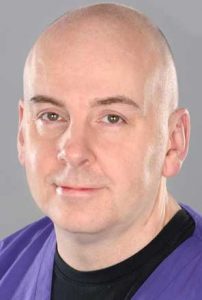 Dr Gareth Clegg – Medical Director
Dr Gareth Clegg – Medical Director
Graduate Edinburgh Resuscitation Academy
Clinical Senior Lecturer and Honorary Consultant in Emergency Medicine, University of Edinburgh
Gareth Clegg is a Senior Clinical Lecturer and Consultant in Emergency Medicine at the Royal Infirmary in Edinburgh. Lead for the Resuscitation Research Group at the University of Edinburgh and co-founder of the Emergency Medicine Research Group.
Gareth trained in Emergency Medicine in South East Scotland and completed his PhD in acute lung injury and epithelial repair at the Centre for Inflammation Research in the Queen’s Medical Research Institute in Edinburgh. His group collaborate widely in order to tackle the system constraints determining the success of prehospital resuscitation.
RRG initiatives include the Resuscitation Rapid Response Unit (3RU) operating across the city of Edinburgh, examination of the interactions during emergency call handling, video analysis of team performance during OHCA and development of an optimal ICU post ROSC care bundle. The 3RU team were winners of the BMJ Emergency Team of the Year award 2014.
Gareth also serves as the chair for the Scottish Ambulance Service Research and Development Committee and their Clinical Advisory Group. He is currently working with the Scottish Government as a subject specialist helping to devise the national strategy for Out-of-Hospital Cardiac Arrest management.
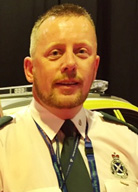 David Bywater – Course Director
David Bywater – Course Director
Graduate European Resuscitation Academy
Scottish Ambulance Service
David joined the Scottish Ambulance Service in 1996. He has extensive experience in working in urban, remote and rural regions. David has worked across all areas of the service. In his current role as Consultant Paramedic, he is the lead for the Scottish Ambulance Services commitments to the National Out of Hospital Cardiac Arrest Strategy. David is an experienced pre-hospital emergency care instructor, teaching regularly on both adult and paediatric courses. He is the Vice Chair of BASICS Scotland and a course director for the ERA in Scotland 2016 & 2017.
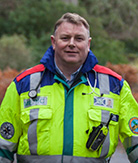 Graeme Ramage – Course Director
Graeme Ramage – Course Director
Graduate European Resuscitation Academy
Sandpiper Fellow, BASICS Scotland
Graeme has worked in the Scottish Health Service for over 30 years mainly within Acute Care and Resuscitation Medicine. He has vast experience in teaching Advanced Life Support skills within both the in-hospital and pre-hospital environment.
 Steven Short – Course Co-ordinator
Steven Short – Course Co-ordinator
Graduate European Resuscitation Academy
OHCA Clinical Effectiveness Lead, Scottish Ambulance Service
Steven is responsible for ensuring the clinical staff of the Scottish Ambulance Service are delivering an expert response to OHCA. His work includes rolling out a blended learning package to ensure SAS clinicians understand the importance of, and can deliver, high performance CPR, ensuring OHCA in Scotland has the leadership required with the development of a 2nd tier response to cardiac arrest and creating a system of feedback and debrief for staff. This work is part of a wider system that is being created with the aim of dramatically improving the outcomes for out-of-hospital cardiac arrest in Scotland. He also has a special interest in end of life care and DNACPR to ensure resuscitation is not performed on those who would not benefit from it.
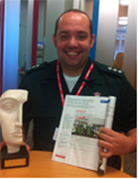 Colin Crookston – Course Co-ordinator
Colin Crookston – Course Co-ordinator
Graduate Seattle Resuscitation Academy
National Patient Safety Manager, Scottish Ambulance Service
Colin is the National Patient Safety Manager for the Scottish Ambulance Service, a member of the Resuscitation Research Group and one of the founding members of 3RU. He is also a Fellow of the Scottish Patient Safety Programme and a Fellow of the College of Paramedics. Currently, Colin is also a Clinical Doctorate student at the University of Stirling.
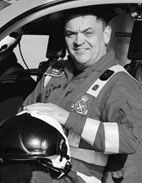 Paul Gowens – Faculty
Paul Gowens – Faculty
Graduate Seattle Resuscitation Academy
Lead Consultant Paramedic, Scottish Ambulance Service
A Fellow of both the College of Paramedics and Health Foundation, Paul was previously National Clinical Advisor at the Scottish Government for Out of Hospital Cardiac Arrest and for Major Trauma. Passionate about OHCA, he is a graduate of the Seattle Resuscitation Academy, as well as being a member of the Utstein Global Resuscitation Alliance and Resuscitation Research Group, Edinburgh.
 Garry MacKay – Faculty
Garry MacKay – Faculty
Graduate European Resuscitation Academy
Scottish Fire & Rescue Service – Group Manager, City of Glasgow
Garry joined the Fire Service in 2001 and has worked within front-line operations, response and resilience, managed the national fire and rescue service college and is now an area-based Group Manager. An honours graduate in Risk Management, Garry is now working with the SFRS team responsible for developing the fire service role within Scottish OHCA response.
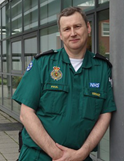 Paul Aitken-Fell – Faculty
Paul Aitken-Fell – Faculty
Graduate European Resuscitation Academy
Lead Consultant Paramedic, North East Ambulance
Paul Aitken-Fell is the the Lead Consultant Paramedic for the North East Ambulance Service NHS Foundation Trust. He is an active member of the Critical Care Response unit with a tertiary response to all Critical Care Cases in the Trust. He has the strategic responsibility for developing and implementing the Trusts Cardiac Arrest Strategy and has a particular interest in Advanced Paramedic systems including cardiac arrest management. Paul is also the Clinical Director for the BANE Basics scheme in the North East of England and the Chair of the College of Paramedics Consultant Group.
 Dan Haworth – Faculty
Dan Haworth – Faculty
Graduate European Resuscitation Academy
Clinical Effectiveness Manager, North East Ambulance
Dan is a Paramedic and Clinical Effectiveness Manager for the North East Ambulance Service NHS Foundation Trust and an active member of the cardiac arrest response unit. He has over 15 years’ experience of providing pre-hospital care within UK ambulance services working as a Paramedic, team leader and clinical educator. Dan has a particular interest in how we can use data to improve the quality of care provided during resuscitation.
